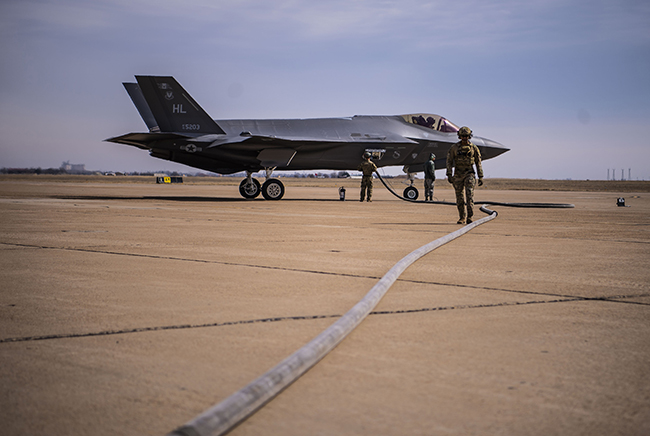
Airmen from the 27th Special Operations Logistics Readiness Squadron refuel a F-35A aircraft during Forward Area Refueling Point training at Cannon AFB, N.M., on Feb. 27, 2019. Air Force photo by SSgt. Luke Kitterman.
The Pentagon’s Inspector General, in an audit released June 13, said Lockheed Martin provided parts for the F-35 fighter that didn’t have required electronic logs, but the company got its incentive fees anyway. Making up for this problem cost the government manpower hours, however, and the company should pay these costs back, according to the IG.
Lockheed was supposed to provide certain parts—wheel, seat, and window assemblies, for example—that were “Ready for Issue,” or RFI, meaning they were ready to be used operationally. Those parts, by contract, were to be sent with an electronic log that would count their hours of use and part history, so service or replacement could be done at the appropriate time. The IG said a lot of parts came without the logs, requiring government maintainers to manually create those records. Moreover, if those records weren’t kept, or mistakes are made on them, a potential safety of flight issue could occur if a part isn’t replaced when necessary.
The provision of fully usable parts, with their logs, is part of how Lockheed’s incentive fees are calculated. The IG said Lockheed got $10.6 million in fees that shouldn’t have been paid because aircraft were judged available when, because of the absent logs, they technically were not fully available.
This has been going on since 2015, the IG said, and so far it has cost the Pentagon $303 million in labor costs to create those logs, and it will “continue to pay up to $55 million annually for non-RFI spare parts until the … issue is resolved.”
The IG also said the Joint Program Office was aware of the problem but didn’t take steps to either track the non-RFI parts or enforce the contract as it applied to non-RFI parts.
The IG recommended the Defense Contract Management Agency do the following:
- Take steps to get compensation for the manpower hours used to cope with the absent logs
- Add language to future contracts guaranteeing compensation for non-RFI problems
- Set up a way to track non-RFI parts at F-35 operating locations
- Track the manual processes used when the logs are missing, and then track the effect of all this on aircraft availability.
In addition, the lead contracting officer should increase oversight of contractor performance to “identify systemic contractor problems,” like the non-RFI parts issue, according to the report.
The Joint Program Office agreed with all of the IG’s findings and recommendations, but hasn’t yet complied with them. The JPO said it’s looking back to 2015 to document the problem, and working on a “consideration package” to be paid by Lockheed for the costs associated with it. The JPO also agreed to add this issue to future contract negotiations so there’s a mechanism to deal with it in the future.